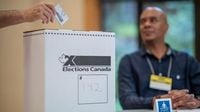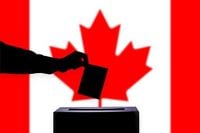Canadians are heading to the polls today, April 28, 2025, to elect their next federal government after a 36-day campaign heavily influenced by a trade war initiated by U.S. President Donald Trump. Polling stations across the country are open for 12 hours, from 9:30 AM to 9:30 PM in Quebec and Ontario, while Atlantic provinces will open from 8:30 AM to 8:30 PM. In the West, the hours vary from 7:00 AM to 7:30 PM, depending on the region.
Voters can find their specific polling locations using their voter information card, which is mailed to them, or through the Voter Information Service available on the Elections Canada website. Elections Canada has clarified that all voters who are in line at the time of closing will be allowed to cast their vote, regardless of how long the wait may be.
As of now, nearly 7.3 million Canadians have already voted during advance polling days, which is about 25.8% more than the 2021 general election. This includes 1.6 million voters from Quebec alone. The advance voting period has seen a significant turnout, and it reflects a growing engagement among Canadians in the electoral process.
Today, voters will choose from a diverse slate of candidates in various ridings. In the Côte-du-Sud-Rivière-du-Loup-Kataskomiq-Témiscouata riding, for instance, seven candidates are vying for the position. These include Bernard Généreux from the Conservative Party, Rémi Massé from the Liberal Party, and Diane Sénécal from the Bloc Québécois, among others.
To vote, Canadians must present valid identification, which can include a driver's license, Canadian passport, Canadian Forces ID, health insurance card, or Indian status card. If a voter does not possess photo ID, they must provide two pieces of identification that include their name and address, such as a credit card or bank statement. It is advisable for voters to bring their voter information card to expedite the voting process.
Employers are legally required to provide employees with a minimum of three consecutive hours to vote if their working hours do not allow them to do so otherwise. This ensures that all eligible voters have the opportunity to participate in the democratic process.
As the polls open, there is an air of anticipation regarding the election results. The first counting results are expected to be available approximately 30 minutes after the polls close, although these will be preliminary and subject to validation in the following week.
Voter turnout is a critical aspect of this election, especially in light of the significant issues that have dominated the campaign, such as the ongoing trade tensions with the United States. Candidates have focused on various themes, including economic stability, housing, and healthcare, with the New Democratic Party emphasizing the expansion of drug insurance.
The Liberal Party, led by Mark Carney, has consistently highlighted the perceived threats to Canada’s economy and sovereignty posed by the Trump administration. Carney’s approach has been to position himself as the most capable leader to navigate these challenges. Meanwhile, the Conservative Party, under Pierre Poilievre, has made promises to crack down on repeat offenders, reflecting a tough-on-crime stance.
In the context of this election, the participation rate during the 2021 general election was recorded at 62.6%, with 17.2 million votes cast out of 27.5 million registered voters. The current election is poised to potentially exceed that rate, given the enthusiasm seen during advance voting.
As the day unfolds, the results will not only determine the makeup of the next federal government but will also reflect the priorities and concerns of Canadians as they navigate a complex political landscape. The consequences of this election will resonate for the next four years, as 343 seats in the House of Commons are up for grabs.
In the new riding of Montmorency-Charlevoix, voters are eager to find out who will be elected as their first deputy. Candidates include Caroline Desbiens and Gabriel Hardy, among others. The results from this riding, along with others, will be closely monitored as they come in.
In summary, today marks a pivotal moment in Canadian democracy as citizens exercise their right to vote, making their voices heard in the shaping of their government. With the stakes high and numerous issues at play, Canadians are encouraged to participate fully in this democratic process.





